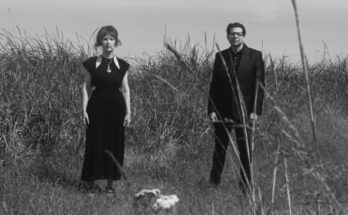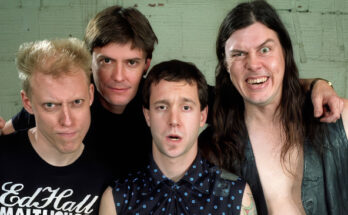The Dears • Lovers Rock • May 15, 2020
(Dangerbird Records)
When The Dears released their breakthrough album, No Cities Left, in 2003, it was a crepuscular, romantic soundtrack to uncertain times. 9/11. War. The looming economic crisis. Nearly two decades later, as Murray Lightburn and Natalia Yanchak began work on the band’s eighth album, Lovers Rock, well… as the meme says, “This Is Fine.”
“There’s a direct line between the sort of doominess of No Cities Left and this album,” says Lightburn. “You could go straight from Lovers Rock to No Cities Left and it’s like they’re interlocked. But it’s a different kind of doom.
“Around 2001, it felt like, ‘We have no control. We don’t know what’s going to happen next.’ Now it’s a doom that’s within our grasp. It’s in the air. It’s between us. But we do nothing about it.”
If The Dears have always made apocalyptic love songs for an existential crisis, there are also other constants, starting, of course, with the band’s two core members for two decades: Lightburn and Yanchak. There are also certain sonic and aesthetic parameters, within which the music can be both unsettlingly experimental and impossibly lush: part Bacharach, part Krautrock. From the anthemic anger and driving resignation of “Heart of An Animal” to the swoony, swerving, epic first single, “The Worst In Us,” Lovers Rock is the sound of The Dears topping themselves yet again, an accomplishment borne of ambition, hard work and a strong sense of identity.
“We know who we are,” says Lightburn. “And we know who is listening. This is a really tight record that says everything we need to say at the moment.”
With its title, Lovers Rock nods to both Jamaica and the Clash, but as the record evolved, any specific musical connection to those things receded. “It became what it became,” says Lightburn.
But the title lingered, both as a lyric, and as a metaphor with sci-fi overtones. “We’ll make it last forever, on lovers rock,” Lightburn sings on the album’s closer, “We’ll Go Into Hiding.”
“I’m fascinated by the idea that we can’t get off this planet,” Lightburn says. “We gravitated towards Lovers Rock being a place that we’re trying to get to. Or escape.”
“Or maybe it doesn’t exist anymore,” adds Yanchak.
Lightburn was still touring his solo record, 2019’s Hear Me Out, as work began on Lovers Rock. But, says Yanchak, “the band is never off.” And Lightburn rarely lacks for inspiration. “For us, the tank is never empty,” he says. “For me it’s like an onslaught of ideas and sounds, and then I can’t keep up half the time. It’s a feverish process. Every record that we make, there’s a ton of songs.”
So much so that the last Dears album wound up being two: 2015’s Times Infinity Volume One, and 2017’s Times Infinity Volume Two. Even the first track on this record dates back to well before that time.
“‘Heart of an Animal’ is a song I’ve tried to get on a Dears record for the last three Dears records,” Lightburn says. “Finally, I’m like… this is going to be the first song on this record!”
On Lover’s Rock, Lightburn (vocals, guitar, “other”) and Yanchak (vocals, piano) are joined by longtime drummer Jeff “Looch” Luciani, who’s been in the fold since 2011’s Degeneration Street, and two holdovers from Lightburn’s solo record, Steve Raegele (guitar) and Rémi-Jean LeBlanc (bass). There’s also a string section, a cameo from fellow Montrealer Sam Roberts (who was also on No Cities Left) and saxophone from both Canadian Alex Francoeur and the E Street Band’s Jake Clemons (on the rattling “Stille Lost”).
Just by being at it for so long, The Dears are able to work faster and more efficiently, which is also especially important when you have two kids (and the business is less remunerative than ever). “The Dears aren’t fucking around,” says Lightburn. “We don’t have time to waste. We’ve got a job to do. And we’re going to do it. 20 years ago, I knew I had a sound in my head, but I didn’t know how to get that down. Now I know how to get that sound.”
That sound can be beautiful or disorienting or both. “When I first sat back and listened to the record, I was like, this is a fucking weird record,” says Yanchak. “We make weird music.”
You could still call it pop music, “but it’s a different kind of pop music,” says Lightburn. “It’s very focused on a certain type of person. Something that’s consistent with the albums that we make is that they reveal themselves to you the more you listen to them. And they also reveal something yourself.”
“I Know What You’re Thinking And It’s Awful” has a soulful, dreamy vibe that belies its ominous title, which also took some more lighthearted inspiration from Lightburn’s father. “He used to say ‘I know you like a book,’ and one time my brother replied ‘am I a bestseller?’,” remembers Lightburn. “Which the old man found amusing. The downside was from then on, whenever he was really mad at me he’d say ‘I know you like a book, son…and you’re NOT a bestseller.’ True story.”
“Instant Nightmare!” could be the theme song to a sci-fi horror movie – sinister vocals and rat-a-tat keyboard, from Yanchak, with metal-heavy bass and guitars. But it’s as darkly funny – “I know you’re trying so hard/to be or not to be a fuck-up” (hi Shakespeare!) as it is fatalistic. “We know it’s all a scam!,” the song finally declares.
“The question we’re asking in the music is, ‘how do we navigate so much bullshit in this world?’” says Lightburn. “We’re still playing this dumb rock music. But there’s always gonna be a little twist of the knife, cutting into something deep to make you feel like you’re alive. To say, ‘I know what you’re going through. And I’m hearing you, and I’m with you.’ That’s what the music is supposed to do.”
Lightburn’s Twitter bio says he’s the singer in “a Dears cover band,” partly because he feels like the music doesn’t actually belong to him. The Dears always have who’s listening in mind when they are writing and recording. Neither Lighbturn nor Yanchak buy the idea that artists should make whatever strikes their fancy, for the fans to take or leave.”
“I reject the idea of making something for yourself,” says Lightburn. “That’s public masturbation.”
“You should just not release it if you’re making it for yourself,” says Yanchak. “Just make it and then put it away, because the person you made it for has heard it already.”
“I’m embracing the idea that we’re providing a service,” Lightburn says. Part of that, he thinks, comes from being a parent. “I’m in service to these other humans, so I embrace that role as an artist. I’m making this music because I know that there’s people out there who need it. The people that I meet on the road, they tell me what this music means to them. And I think about them when we write, and I think about them when we’re making each record. That’s who I want to continue a relationship with.”


